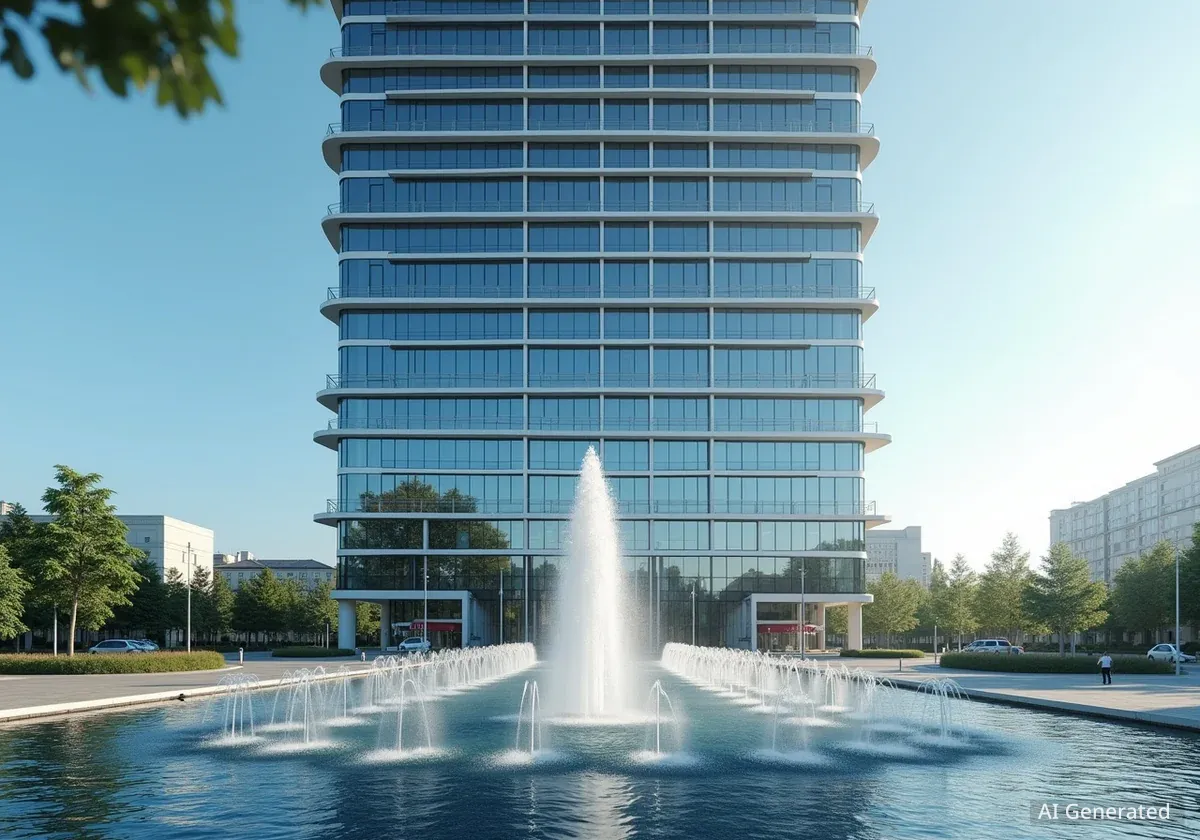Ecolab, a global leader in water and hygiene solutions, has entered into a strategic partnership with CBRE, the world's largest commercial real estate services firm. The collaboration aims to significantly improve water efficiency and quality for clients across CBRE's vast portfolio of managed properties, which collectively use an estimated 100 billion gallons of water each year.
Key Takeaways
- Ecolab and CBRE have launched a partnership to enhance water management in commercial real estate.
- The initiative targets nearly 8 billion square feet of properties managed by CBRE globally.
- A primary focus is on water-intensive sectors such as data centers, life sciences, and advanced manufacturing.
- Clients will gain access to Ecolab's water technologies to reduce consumption, cut costs, and improve operational performance.
A Partnership Targeting Water Consumption
The new alliance combines Ecolab's specialized expertise in water technology with CBRE's extensive global reach in property management. This collaboration will provide CBRE clients with direct access to Ecolab's proprietary services and technologies designed to optimize water use.
CBRE estimates that the properties it manages consume over 100 billion gallons of water annually. The partnership seeks to address this substantial consumption by implementing proven strategies for water reduction and quality improvement, leading to both environmental and economic benefits for building owners and tenants.
The goal is to create a comprehensive approach to water management that integrates sustainability objectives with core real estate strategies. By doing so, the companies aim to help businesses unlock new value and achieve measurable impacts on their environmental footprint.
Background on the Companies
Ecolab is a global company specializing in water, hygiene, and infection prevention solutions. With over a century of experience, it provides science-based services to optimize water and energy use for customers in various industries. CBRE Group, Inc. is the world's largest commercial real estate services and investment firm, managing nearly 8 billion square feet of property globally.
Focus on High-Tech and Industrial Sectors
The partnership places a strong emphasis on industries where water is critical for operations, such as data centers, life sciences, and advanced manufacturing. In these sectors, water availability, quality, and efficiency are directly linked to operational uptime and precision.
Many companies in these fields already utilize smart water systems to protect their operations and meet sustainability targets. This collaboration aims to further align those efforts with broader real estate management, creating a more cohesive strategy for resource conservation.
"Water is central to operational impact and profitable growth for many businesses," said Emilio Tenuta, Ecolab’s senior vice president and chief sustainability officer. "In manufacturing, up to 75% of energy flows through water systems. That makes water efficiency—and water quality—a powerful lever for climate resilience and business performance."
Ecolab's existing programs have already assisted thousands of companies in saving billions of gallons of water, which also contributes to energy conservation and reduced emissions. This track record demonstrates a clear link between sustainable practices and improved business performance.
Water and Energy Connection
According to Ecolab, up to 75% of the energy used in manufacturing facilities flows through water-based systems for heating and cooling. Improving water efficiency can therefore lead to significant energy savings and a reduction in greenhouse gas emissions, directly impacting a company's climate resilience goals.
CBRE's Expanding Sustainability Services
This collaboration with Ecolab is the latest in a series of moves by CBRE to bolster its sustainability offerings for clients. The real estate giant is actively building a network of partners to address the complex environmental challenges faced by property owners.
Recent initiatives include collaborations with Climate X, a platform for climate risk analysis, and Deepki, a sustainability data intelligence platform. Additionally, CBRE acquired the renewable energy advisory group from NRG, further strengthening its capabilities in the clean energy space.
Strategic Importance of Water Management
The leadership at both companies views water management as a critical component of modern business strategy, particularly in high-growth sectors.
"We are focused on creating value for our clients by solving their biggest sustainability challenges, and water is increasingly important, especially in sectors like data centers, life sciences and advanced manufacturing," stated Rob Bernard, chief sustainability officer at CBRE.
Bernard added that the combined scale and expertise of the two firms offer a distinct advantage for companies looking to address their water needs comprehensively. He suggested the partnership has the potential to transform water use across the commercial real estate industry.
The Broader Impact of Water Efficiency
Improving water management in commercial buildings offers a range of benefits that extend beyond simple cost savings. Efficient water use is becoming a key factor in corporate sustainability reporting and can enhance a company's brand reputation.
The key benefits for participating businesses include:
- Cost Reduction: Lower utility bills from reduced water and associated energy consumption.
- Operational Resilience: Mitigating risks related to water scarcity and ensuring business continuity, especially in water-stressed regions.
- Enhanced Performance: Improved efficiency of building systems, such as cooling towers and HVAC, which rely on water.
- Sustainability Goals: Helping companies achieve their environmental, social, and governance (ESG) targets.
As businesses face increasing pressure from investors, regulators, and customers to operate more sustainably, initiatives like the Ecolab-CBRE partnership provide practical solutions to address these demands. The program offers a clear path for property managers and tenants to contribute to broader environmental goals while simultaneously improving their bottom line.





